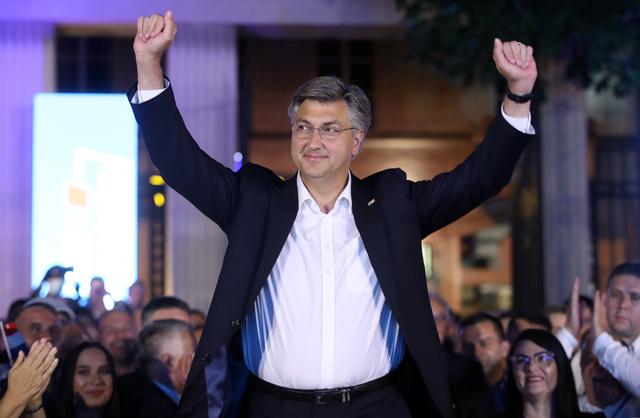You are here
Croatia conservatives hail ‘great’ reelection victory
By AFP - Jul 06,2020 - Last updated at Jul 06,2020

Croatian Prime Minister and leader of the Croatian Democratic Union Party (HDZ) Andrej Plenkovic (centre) celebrates with party members after declaring the victory on parliamentary elections at the garden of the Archaeological Museum in Zagreb, on Sunday (AFP photo)
ZAGREB — Croatia's conservatives scored a reelection victory in a parliamentary vote on Sunday, official results showed, putting them in a strong position to build a government that will inherit the economic fallout of the coronavirus pandemic.
The vote was held under the shadow of the global health crisis, with the Adriatic country's tourism-dependent economy on course for its steepest decline in decades.
The Croatian Democratic Union (HDZ), which has dominated the country for most of its nearly 30-year independence, fell short of an absolute majority but outperformed its main rival by a long shot.
The party took 68 seats in the 151-member house, followed by 42 for the centre-left coalition led by the Social Democrats (SDP), according to official results with nearly 90 per cent of the ballots counted.
In third place with 15 seats was the new “Homeland Movement” party led by a folk singer who appealed to hardliners on the right with nationalist rhetoric.
"Our victory is not only great but binding," Prime Minister Andrej Plenkovic said of his HDZ Party's task to "work with all our hearts for Croatia".
"We had a difficult mandate full of challenges behind us and the challenges ahead of us are even greater," he said.
The ruling party had campaigned on its relatively successful containment of the country's virus outbreak so far, reporting some 110 deaths and 3,000 infections in the country of 4.2 million.
Plenkovic, a former MEP with strong backing from Brussels, was cast as a safe pair of hands to navigate the coming economic downturn.
The SDP-led opposition had accused their right-wing rivals of endangering citizens by "rushing" to hold the elections even as the country logged a new uptick in infections in recent weeks.
They had also highlighted HDZ's history of corruption, which was brought back to the spotlight by a recent scandal involving a top official.
But despite polls putting the two camps neck-and-neck, the conservatives prevailed with a resounding lead.
After the results came in Social Democrat leader Davor Bernardic said he was ready to step down and congratulated the "electoral winner which is HDZ and Andrej Plenkovic".
Their camp was also hurt by the rise of a new green-leftist group, Mozemo, who garnered some seven seats in its parliamentary debut.
Corruption, emigration
The HDZ's outgoing environment minister Tomislav Coric said he expected the party to find coalition partners in the coming days.
There are "political options that are close to us from both ideological and program point of view", he told local television.
One path to the 76-seat majority would be to ally with eight ethnic minority MPs.
In that case HDZ would not need the votes of the “Homeland Movement” led folk singer Miroslav Skoro, who lured away traditional HDZ voters disappointed with Plenkovic's more moderate stance.
The singer founded the party after he finished third in the country's presidential election in December.
"We are on a good path and voters have recognised that," Skoro said of his third-place ranking.
During the campaign the 57-year-old drew sharp criticism from the left for sexist remarks, an anti-migrant stance and tolerance of Croatia's pro-Nazi past.
While the coronavirus crisis dominated the campaign, older problems like corruption and high emigration were also on the minds of some voters.
"There is not enough focus on Croatians leaving for abroad, unemployment and poor salaries of young people," retired teacher Branka Tekavec told AFP.
Voters were advised to wear masks and bring their own pens to polling stations while officials paid home visits to collect the ballots of 500 people — some 10 per cent of those in self-isolation — who requested to vote.
Others infected with the virus were able to cast ballots through a proxy.
Related Articles
ZAGREB — Croatia’s conservative president narrowly made it to a run-off election against a leftist former premier on Sunday, after a nationa
ZAGREB — A high-profile graft case involving Croatia's health minister has stoked fresh anger at the country's public health system, with pa
ZAGREB — Croatia’s President Zoran Milanovic called for his country to stick to a cautious diplomatic path amid surging geopolitical uncerta












